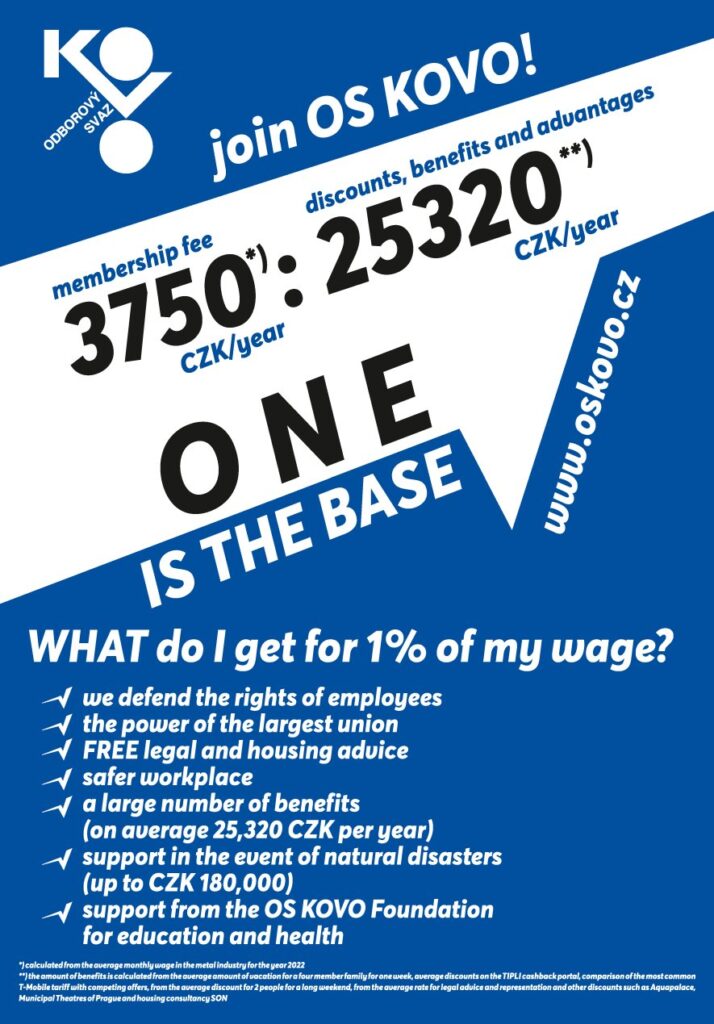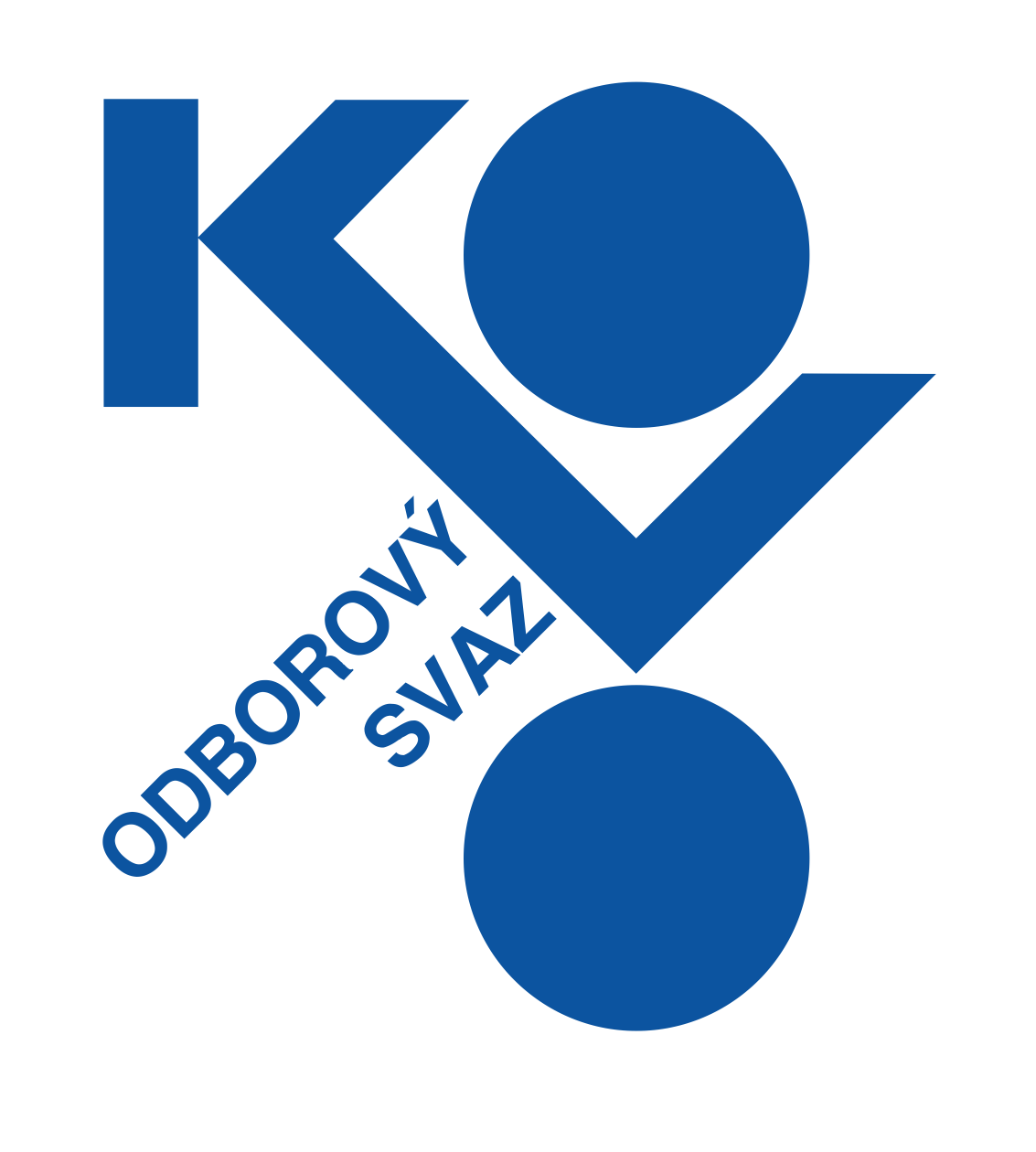
Czech Metalworkers‘ Federation (OS KOVO)
What are trade unions?
There are many myths and inconsistencies circulating in society and especially among young people about what trade unions are, what their mission is and what their function is. These include, for example, claims that unions are a kind of tax-funded government agency.
Trade unions are legal entities in the form of associations – mainly employees, established with the aim of promoting the labour, economic, political, social and other interests of their members. After the recodification of private law on January 1, 2014, the law of association is adequately applied to trade unions.
Odbory jsou v souladu s Listinou základních práv a svobod a zákoníkem práce zástupcem zaměstnanců. Odborům náleží u zaměstnavatele právo na:
In accordance with the Charter of Fundamental Rights and Freedoms and the Labour Code, trade unions are representative of employees. Trade unions have with the employer the right to:
- information (e.g., about the economic and financial situation of the employer)
- consultation (e.g., when determining the amount of compensation for property damage to an employee)
- control (e.g., over the state of working conditions and health and safety)
- co-decision (e.g., when issuing a vacation plan)
- collective bargaining and conclusion of collective agreements.
Unions are financed by the membership fees of their members. Trade unions are often seen as a remnant of the communist regime, but in fact the history of trade unions in our country dates back to far before the period of the Communist Party’s rule (up to the second half of the 19th century) and the idea of union association was only abused by the totalitarian establishment.
Another myth is that unions are some kinds of tool or extension of political parties. In fact, trade unions are an independent and non-political civil association whose aim and purpose are to protect the economic and social interests of employees. Despite the fact that unions themselves do not engage in political activity, they must communicate with government officials and individual political parties as part of their activities, when they promote the interests and rights of employees, which does not, however, make them a political entity.
The activity and mission of trade unions
The main mission of trade unions is to represent and defend the economic and social interests of employees. The right of employees to freely join trade unions and the right of trade unions to freely develop their activities is guaranteed both within the Czech constitutional order and in international legal documents. These include, in particular, the Universal Declaration of Human Rights, the International Covenant on Economic, Social and Cultural Rights or the European Convention on Human Rights. Trade union rights were also formulated in the conventions of the International Labour Organization, a specialized UN organization that operates on a tripartite basis and whose activities include not only governments but also unions and employers.
In relation to employers, trade unions do not act as a rival, but as a representative of employees and a social partner. They balance the relationship between the employer and its employees. At employers, the activities of trade unions are not only focused on improving working conditions, ensuring work safety and striving for a fair evaluation of the work of employees. It also aims to improve communication and strengthen mutually open relationships between the employer and its employees.
Therefore, unions cannot be seen as someone who hinders the economic development of employers. On the contrary, it is a fact that developed social dialogue and high-quality communication between employees and the employer, their constructive relations built on social peace, lead to higher efficiency and productivity of work. These are tools that increase the competitiveness and prosperity of employers.
The mission of trade unions is therefore to defend the interests of employees, defend their rights in labour relations and contribute to the development of a socially cohesive and democratic civil society.
The main values of trade unions are social partnership, democracy, openness and solidarity.
What are unions good for?
The employee alone is not an equally strong partner for the employer. Employee always remains the weaker side and gets the short end of the stick. Employees can therefore assert their rights only together.
Trade unions are an insurance policy for you in your job, because the trade union organization can help you in asserting your demands and needs with the employer. Through a collective agreement, they can negotiate for you an increase in your wage and an extension of your holiday, a reduction in working hours and safe working conditions and environment.
Only trade unions can conclude a collective agreement with the employer. A collective agreement is the result of negotiations between an employer and a trade union. It is an effective and binding tool to enforce dignified, decent and fair working conditions.
Unions provide assistance in preventing conflicts and solving problems at work. They also provide free legal advice and, in extreme cases, legal representation in labour law disputes.
Unions are here because they know and can contribute to improving communication between the employer and employees, to achieving a good corporate culture and a pleasant working atmosphere. Can prevent or solve the consequences of negative phenomena such as mobbing, bossing, discrimination and bullying at work.
Trade unions can fulfil their functions and missions only if they are sufficiently representative and rely on a strong membership base. And you can influence that too!
How can unions benefit me?
- they will negotiate a wage increase for me
- they will help me to solve my problems at work
- they will provide me with protection from dismissal
- they will provide me with free legal advice
- they will negotiate a higher severance pay for me
- they will provide me with a longer holiday
- they will check work safety
- they will improve communication between the employee and the employer
- they will contribute to the creation of a better company culture
- they will negotiate higher payments for me for working at night or on non-working days
- they will provide me with benefits such as meal vouchers or a holiday allowance
Why should I be a union member?
- because I want more money for my work
- because they will help me solve problems at work
- because unions help contribute to the reconciliation of family and professional life
- because I want to know what is happening at my employer
- because I can participate in improving working conditions
- because I don’t want to be liked by the employer’s violation of the law
- because I want to influence what happens at work
- because I will receive a large number of benefits, advantages and discounts
Application
If you are interested in the benefits of membership in the Czech Metalworkers‘ Federation (OS KOVO), and you want to be part of a large and strong family of trade unionists, fill in an application at your Company Trade Union Organization. Application forms in your language can be found in the attachment. The application must be filled in in the Czech language.
